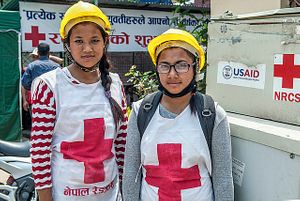A little over a month has passed since Nepal suffered a devastating series of earthquakes that have killed more than 8,000, left large areas of the countryside in ruins, triggered disruptive and dangerous landslides, and crippled an already ailing economy.
Yet there is optimism in the air. There is a sense that the earthquake, terrible though it was, brought to light many hidden Nepalese strengths. Concern for the suffering of their fellow citizens, entrepreneurial energy, the ability to quickly and effectively develop networks and mobilize them to deliver aid – all were observed in the aftermath of the quake. The sheer number of people coming out to help is unparalleled. Many of these volunteers have chosen to take extreme personal risks to help their fellow countrymen. Volunteers travelled to the epicenter of the earthquake only days after the event. Others journeyed along half destroyed mountain roads where the dangers of falling rocks and landslides are ever-present, as is the risk of falling off the hillsides into the valleys below. Even those travelling by helicopter are taking a risk, as the crash involving a U.S. Marine helicopter demonstrated. The mountains of Nepal are unforgiving of mistakes at the best of times.
The fact that volunteers, many of whom enjoyed comfortable lives in Kathmandu before the quake, have chosen to take such risks shows that there is a genuine feeling of compassion towards those who are less fortunate. Kathmandu’s young denizens are sometimes accused by rural politicians and commentators of being self absorbed and materialistic, and no doubt, there is truth in that. But their response to the earthquake showed that they do also have a humane, altruistic side.
The volunteers may not have yet made a real difference in the lives of a majority of the people affected by the catastrophe, but they have shown what is possible. Had they been better able to coordinate their efforts with one another, and with security agencies, government workers, large NGOs, and political cadres, it is worth thinking how much more they could have achieved. Volunteers have been able to utilize and build on existing social networks to transport relief and deliver other kinds of aid. However, it is clear that only a small fraction of these networks have been tapped. There are different, overlapping social networks in Nepal – political parties, business organizations, ethnic/familial groups and natural resource user groups, among others, all have their own networks. Had all these networks been able to coordinate their efforts with one another, relief could reach affected people much more effectively. FECOFUN, an association of community forest user groups is thought to have over nine million members spread over fourteen thousand different groups. Obviously, it is a loose, informal network otherwise it would have been able to mobilize members very effectively. But it does point to the potential for change that is possible, if communities can coordinate and mobilize themselves more quickly. Indeed, these communities may be holding a wealth of indigenous knowledge, which, if disseminated and applied, could prove to be very effective for reconstruction in the future.
Compared to the oft-disciplined, nimble-footed response from the volunteers, the Nepali government’s response appears halfhearted and clumsy. By setting up onerous rules for dispensing aid, it has appeared to hamper the relief process. Early on, donors complained that the Nepali government seemed unable to comprehend the changed scenario. A poor and undeveloped country teetering on the edge of chaos cannot afford to impose more hurdles on the path of recovery just because the government is afraid to lose control over the relief/recovery mechanism. That will only make the situation far worse. Nepal’s politicians seem unable to make a very basic comparison. What is more important: that the state have complete control over the aid delivery mechanism, or that millions of people – now consigned to live in temporary shelters and at the mercy of the weather, wild animals and disease – should be able to live a dignified existence as soon as possible? Anyone with a concern for humanity would say that the latter is far more important. If the squabbling politicians were foolish enough to weaken the state so much before, why should the public have to pay for that now?
While the Nepalese government should not yield on safety standards, it should try as far as possible to minimize the onerous bureaucratic process that has been blamed in the past for hampering relief. Credible reports suggest, however, that the lessons have not been learnt as lawmakers and the Army continue to reject any perceived outward interference. Given the fragile nature of the Nepali state, foreign powers have interfered – blatantly or covertly – in Nepalese politics in the past. Therefore, the paranoia of the Nepali political class, and a large section of its elites – is not without a basis. But again, this is the wrong time to be taking an unyielding stance on national sovereignty.
What the aftermath of the earthquake showed is that there is tremendous potential for change that is possible, if urban volunteers and rural communities can join forces. Urban volunteers, with their access to social media and contacts with the development community, can mobilize themselves quickly. Rural communities, however, should not be thought of as passive recipients of aid. Rather, like the members of FECOFUN, they often have a formidable knowledge of their territory, and are the guardians of indigenous knowledge. If this kind of knowledge is shared and applied, it could prove to be very effective for reconstruction in the future. The government, instead of trying to implement a one-size-fits-all solution, should listen to the people, and create an environment in which people can help themselves.
Manish Gyawali is a graduate of Miami University and Kathmandu University. He is a consultant and writer.

































